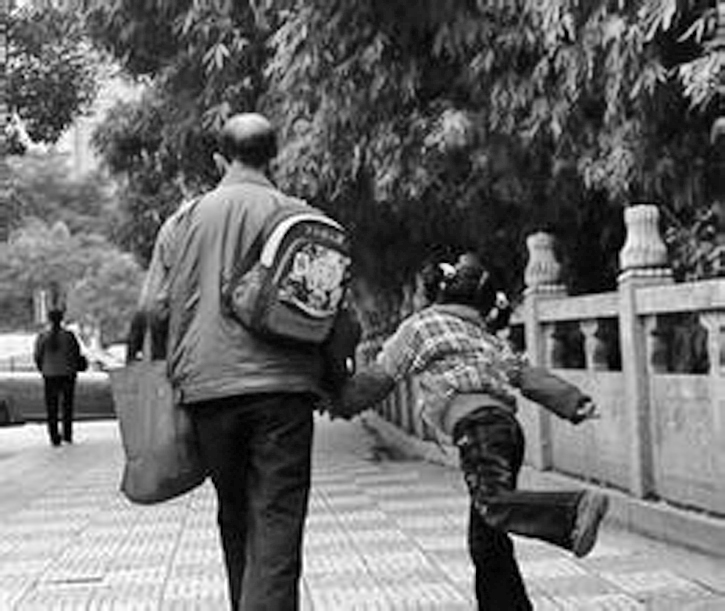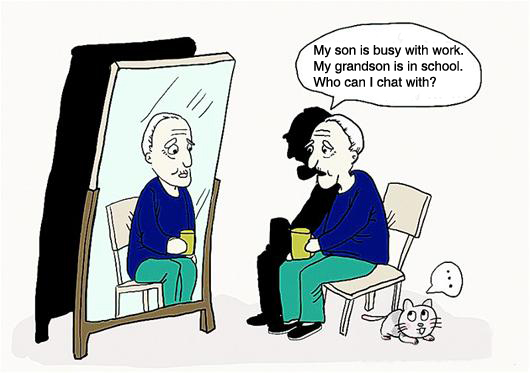Social problems faced by relocated elders in China

The elders move to cities to live with their adult children and care for their grandchildren.

Relocating in old age has brought about problems in mentality, culture and social insurance.
“Laopiao”, coined after “beipiao” or “Beijing Drifters” (young people migrant into Beijing making for a living, but they don’t feel secured either in terms of mentality or jobs), refers to the elders aged between 50 and 70 who left their hometown and move to cities to live with their children for caring their grandchildren. They become a unique group that has emerged in China’s current social transition.
Grandparents have long played a key role in raising grandchildren within China’s traditional family culture. However, a recent survey found that many families in Chinese cities are impacted by increasingly advanced globalization, industrialization and urbanization. Relocating in old age has brought about problems in mentality, culture and social insurance.
Changing family structure
In the mid-1980s, an empirical study conducted in Tianjin found that family life in Chinese cities was undergoing transition between the “core family” comprised of a couple and their unmarried children and the “stem family” comprised of a married couple and their parents or in-laws. Researchers found that around half of young people from “core families” in cities lived with their parents after marriage, constituting a “stem family.” After a period of time, the couple might separate from their parents and live with their unmarried children, thus forming a “core family.” The study found another type of “stem family” might come into being if a couple lived with their married children.
Young married couples continued to live with their parents or in-laws mainly due to a lack of housing, but lived apart from their parents when their housing conditions improved. At the time of the study, urbanization and modernization had just emerged and housing problems were common among urban residents. Indeed, housing became an important factor in the change of family structure. Many young couples had to depend on parents since the latter already had houses.
Great changes have taken place in China amid deepened globalization, industrialization and informatization over the past three decades. Hundreds of millions of people have migrated to cities, most of whom are young people. This has also led to a new change in family structure in cities.
Studies have found that many young people nowadays live apart from their parents after marriage and then together with them, reflecting the opposite of the aforementioned situation in the mid-1980s studies. There are various reasons for this, including affordable housing with improved material conditions, generational gaps and growing individualism. However, the dynamics of China’s floating population play a crucial role in influencing young people’s decision to live apart from their parents.
A survey of 12 families found that nine previously identified as “core families,” in which young couples bought houses for marriage after moving to cities and living apart from their parents. The subsequent birth of their children ushered their transition to “stem families.” Ten of the 12 families interviewed identified as “stem families,” in which parents came to take care of their grandchildren. Another two involved elderly parents living with their adult children for other purposes. Children usually have more advantages in the modern family structure than parents when they established “core families” in cities where there are more resources. In “stem families,” parents become migrants in order to help raise their grandchildren.
Insufficient social services
So, what leads parents of adult children to become “laopiao”? Kurt Lewin (1890-1947), a German-American psychologist, researched social behavior extensively yet only partly answered this question. According to Lewin, social behaviors change with personal and circumstantial factors. On one hand, people adhere to traditional Chinese family concepts such as parenting and responsibility. Raising a loving family is a mainstream social value. Interviews found whether elderly parents or adult children bear the responsibility of caring for younger generations.
On the other hand, in the context of high-speed industrialization and modernization, traditional collective ethos are gradually disappearing. Individualism, prioritizing personal demands and their spousal relationship are becoming more and more important. However, these people are likely to encounter problems in life if they have to relocating when they become old.
A 70-year-old grandfather interviewed said that he and his wife used to have their own daily routine, such as singing, drawing, practicing calligraphy and chatting with their friends, before they assumed responsibility for raising their grandchildren.
“Laopiao” not only face problems associated with their mentality and behavior, but also clashes between prefigurative culture (younger generations learning from elders) and postfigurative culture (elders learning from younger generations) that Margaret Mead (1901-78), a US anthropologist, raised in her 1970 book Culture and Commitment: A Study of the Generation Gap. The old pattern of parents teaching children has changed as young people develop new ideas and knowledge amid Industrialization, modernization and informalization. This has undoubtedly intensified the conflicts between the two generations.
An interviewee with a newly born grandchild said he felt puzzled why today’s young people don’t follow their parents’ ways of raising children. Some young people also complained their parents outdated way for raising children.
Apart from an imbalance in mentality and culture, “laopiao” also face problems associated with social insurance, medical care, education and entertainment.
Despite many problems with the lifestyle of "laopiao", the group is constantly growing. This growth is driven by a variety of factors, according to researchers, including insufficient supply of relevant social services, rejection of strangers and distrust of society.
Joint efforts needed for solution
Families, society and the country should make joint efforts to resolve the problems of “laopiao” created by changes to the Chinese family structure.
Firstly, family atmosphere with cultural mixture should be created. Problems emerging in the family need to be solved through cultural exchanges and interaction. The modernization of society doesn’t mean the lost value of prefigurative culture. Young people should be always aware of such ethical responsibilities as filial piety, respecting and supporting seniors, actively absorb the useful elements of prefigurative culture, care more about their parents and help them relieve pressure. Meanwhile, the elderly should frankly face advanced postfugurative culture with a good mindset, learn more from the youth, actively adapt to the new environment and cultivate new hobbies.
Secondly, social trust should be re-established. Full play should be given to the advantages of professional service institutions and individuals in a bid to relieve family pressure of raising children and aid “laopiao.” Efforts should be made to amend the acquaintance trust mechanism in social transition, perfect relevant systems and provide grassroots public services. In addition, modern parenting attitudes should be fostered to improve scientific and professional parenting skills that benefit the public.
Thirdly, the welfare system should be improved. The government, as the defender of public interests, should bear the responsibility of social insurance for this special group. Policies related to pension insurance, health care and welfare should be formulated and implemented in accordance with the actual financial conditions of the government. Preferential policies should be made to remove difficulties in medical treatment for the elderly and ensure they enjoy the basic social welfare. “laopiao” should also be included in local community service networks.
Bi Hongyin is from the Institute of Public Opinion at Tianjin Academy of Social Sciences.
